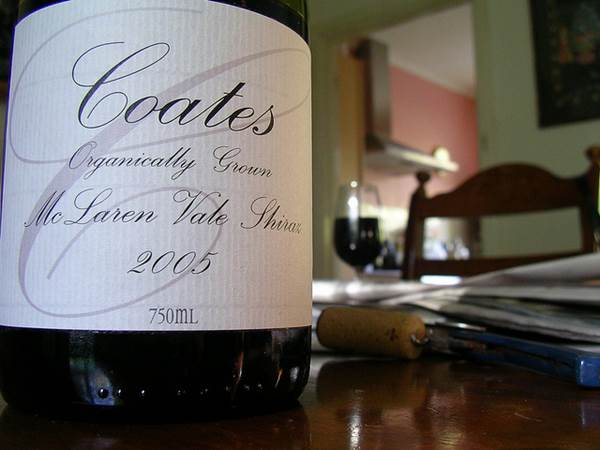 Above: This single vineyard Shiraz has been crafted from the Strachan vineyard in the foothills of Willunga, MacLaren Vale, South Australia. The natural approach to viticulture has extended to “hands-off” winemaking using indigenous yeast with minimal fining and filtration. Maturation for 20 months in 30% new Russian and French barriques was follwed by a rigorous selection of only the best barrels. The 2005 Coates Shiraz provides rich mulberry and aromatic spice flavours with a fine-boned structure. Organic status: Certified organic. Photo & Information Courtesy: Vincent Brown [Image used under Creative Commons License Attribution 4.0 International (CC BY 4.0)]
Above: This single vineyard Shiraz has been crafted from the Strachan vineyard in the foothills of Willunga, MacLaren Vale, South Australia. The natural approach to viticulture has extended to “hands-off” winemaking using indigenous yeast with minimal fining and filtration. Maturation for 20 months in 30% new Russian and French barriques was follwed by a rigorous selection of only the best barrels. The 2005 Coates Shiraz provides rich mulberry and aromatic spice flavours with a fine-boned structure. Organic status: Certified organic. Photo & Information Courtesy: Vincent Brown [Image used under Creative Commons License Attribution 4.0 International (CC BY 4.0)]
Organic wine refers to wine made with grapes that are grown without the use of chemical fertilizers, herbicides, pesticides and any other chemical additives. This not only makes for a healthier wine but also means a richer tasting wine for wine lovers, whereby the full flavor of the fruit can be enjoyed.
In an effort to get back to the natural properties and goodness of food, the wine market is abuzz with the organic wine movement that recommends avoiding any chemicals that could cause health issues. The idea is getting popular worldwide and organic wines have become sought after now in countries like Australia, Chile, France, New Zealand and the USA over the last few years.
The Chemicals Used in Winemaking
Among the chemical used to make wines is sulfur dioxide that is added in small amount to prevent oxidation and to maintain its freshness. The process works in a way in which sulfur dioxide dissolves in the wine mixture and destroys impurities. However, it creates sulfites and many people, being allergic to the same, experience a headache because of its presence.
Organic wine, on the other hand, has no added sulfites; the only sulfites found in such wine are a naturally occurring result of the fermentation of grapes, coming from the skin of the grapes. Therefore, in order to be deemed organic, a wine must maintain a level of sulfites in a measure of less than 100 parts per million (ppm).
It should be noted here that white wines need twice the amount of sulfites that red wines do. Also, European wines are found to have significantly more sulfites than their American counterparts.
Confusion over ‘Organic’ Labels
Now that you are aware of the benefits of organic wine, you might want to check out some of these in the aisles of your local wine store. However, you may get confused by the different ‘levels of organic’ printed on the labels.
In simplest terms, when the label says ‘100% Organic’, it means that the wine is made from certified organic grapes and no sulfites have been added in its creation. This is the purest form of wine available. But if a wine claims ‘95% organic’ on the label, then it means that while 95% of the wine’s ingredients are certified organic, the other 5% is usually yeast.
Understanding Each Country’s Labels
While the basics of finding an organic wine may be based on the facts outlined earlier, each country might have a different labeling policy due to its own winemaking circumstances.
For example, on American organic wine, your may see labels with the words – “Made from Organically Grown Grapes” or simply “Organically Grown”. This means that the vineyards, where the grapes for these wines were grown, have complied with the organic certifying agency of the respective state. However, if it doesn’t say ‘100% Organic’, the wine may contain added sulfites.
Similarly, French Organic wines may be labeled as such without certification. But if you are looking for a certification from the International Federation of Organic Agriculture Movements (IFOAM), you may find a stamp from Eco-Cert, Terre et Vie, or Nature et Progrés on the label.
Why Don’t All Vineyards Get Wine Certification?
While many vineyards follow organic standards and use sustainable agriculture using environmentally friendly techniques, some of them, including larger ones, decide not to get their wines certified as organic. The reason behind this decision is the number of hassles faced by vineyards to get their wines certified. These include the absence of a centralized international organic wine certification and different rules for existing certifications.
The organically certified wine concept is relatively new, so a uniform set of regulations for determining a truly organic wine is still evolving.
With the factors discussed above, it is up to you to look over the labeling of the wine that you are buying carefully to decide whether it’s truly organic or not.
Thanks for letting me know, nice blog. 🙂